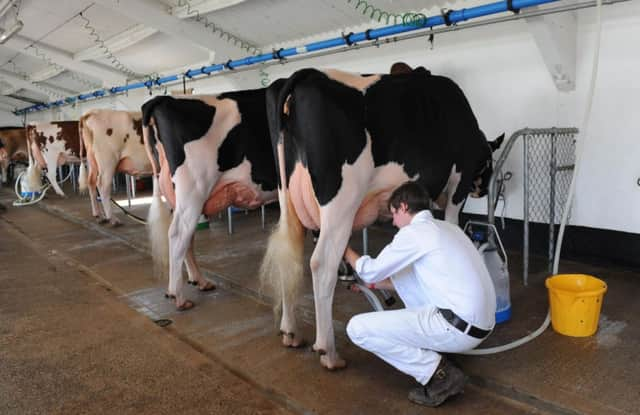Fresh milk price plunge fears as quotas abolished


The farming fraternity enters a post-quotas era not seen for a generation and the National Farmers’ Union (NFU) said many of its members were concerned that today’s removal of national milk production caps will leave them even more vulnerable to price cuts.
The dairy industry has fielded price plunges over the last 12 months as global supply outstripped demand and not without victims. Less than 10,000 dairy farmers now operate in the UK and North Yorkshire alone had 55 dairy farmers quit last year.
Advertisement
Hide AdAdvertisement
Hide AdLatest figures show the average UK farmgate milk price is 26.30 pence per litre - over seven pence less than a year earlier.
Sector champions Dairy UK offered an upbeat response to the end of quotas however, saying it was a great opportunity for the industry.
Milk quotas were originally introduced in 1984 to address the oversupply of milk on the EU market during the late 1970s and early 1980s that led to the infamous milk lakes and butter mountains as dairy products went to waste.
Outlining the challenge facing the farmers, Laurie Norris, dairy lead for the NFU in the region, said: “This year UK dairy farmers have not hit their quota allocation - producing 1billion litres less than the limit. This is in contrast to some other EU countries.
Advertisement
Hide AdAdvertisement
Hide Ad“As a result, for Yorkshire farmers, it is not so much of an opportunity as a threat, with the potential for more milk to be produced in the EU. This could increase volatility and impact on prices further, and lay us open to more imports of processed products.
“What we have seen in other EU countries such as Ireland and Scotland is that the government has helped develop processing capacity to maximise an increase in production. If this was the case in England, we could add value to our products and increase our consumption of UK dairy products as well as increasing our export potential.”
But Dr Judith Bryans, Dairy UK’s chief executive, said the end of quotas was “a landmark in the history of the European dairy industry”, adding: “It is another step towards the ongoing development of a market-led, globally competitive European dairy sector that will be able to fully exploit a growing demand for dairy products worldwide.
Dr Bryans said: “We are keenly aware that with a free market comes greater volatility, and therefore the dairy industry must work hand-in-hand to mitigate the effects of volatility. The UK industry has been gearing up for this new era and is getting ready to face new challenges.”
Advertisement
Hide AdAdvertisement
Hide AdNick Everington, chief executive of the Royal Association of British Dairy Farmers, was cautious, saying: “EU (milk) production is forecast to expand by almost seven per cent within the next 10 years. Whilst a relatively modest figure, some EU states are making significant investment in processing capacity which will help them each to develop their export capacity and introduce increased competition to the market place.
“So far, the UK has made ‘baby steps’ in developing its limited yet officially unknown processing capacity. There are ‘murmurings’ of new investments afoot, however while the UK processing sector sits still, those expanding states will remain a threat.”